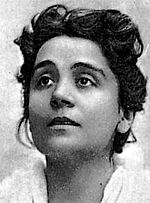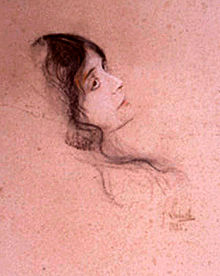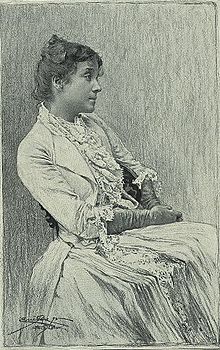- Eleonora Duse
-
Eleonora Duse 
Born Eleonora Giulia Amalia Duse
October 3, 1858
Vigevano, ItalyDied April 21, 1924 (aged 65)
Pittsburgh, PennsylvaniaEleonora Duse (Italian: [eleoˈnɔːɾa ˈduːze]; 1858–1924) was an Italian actress, often known simply as Duse.
Contents
Life and career
Duse was born in Vigevano, Lombardy, and began acting as a child. Both her father and her grandfather were actors, and she joined the troupe at age four. Due to poverty, she initially worked continually, traveling from city to city with whichever troupe her family was currently engaged. She came to fame in Italian versions of roles made famous by Sarah Bernhardt. She gained her first major success in Europe, then toured South America, Russia and the United States; beginning the tours as a virtual unknown but leaving in her wake a general recognition of her genius. While she made her career and fame performing in the theatrical "warhorses" of her day, she is today remembered more for her association with the plays of Gabriele d'Annunzio and Henrik Ibsen.
In 1879, while in Naples, she met journalist Martino Cafiero, and became involved in a fast paced love affair with him. However, less than a year later, while she was in mid-pregnancy, he left her. The baby did not survive birth, and shortly thereafter Cafiero died as well. Duse then joined Cesare Rossi's theater company, and met actor Teobaldo Checchi. The two married in 1881. By 1885, the couple had one daughter, Enrichetta, but divorced after Duse became involved with another actor, Flavio Ando.
By this time, her career was in full swing and her popularity began to climb. She travelled on tour to South America, and upon her return a year later she formed her own company, meaning that she would assume the additional responsibilities of both manager and director.
Between 1887 and 1894 she had an affair with the Italian poet Arrigo Boito, perhaps best remembered as Verdi's librettist. Their relationship was carried out in a highly clandestine manner, presumably because of Boito's many aristocratic friends and acquaintances. (Despite this, their voluminous correspondence over the years survives.) In later years the two remained on good terms until his death in 1918.
In 1895 she met Gabriele d'Annunzio, who was five years her junior, and the two became involved romantically as well as collaborating professionally. Gabriele d'Annunzio wrote four plays for her. In contrast to her relations with Boito, her association with d'Annunzio was widely recognized. When d'Annunzio gave the lead for the premier of the play La Città morta to Sarah Bernhardt instead of Duse, there was a furious fight, and Duse ended her affair with him.
In contrast to Bernhardt's outgoing personality, which thrived on publicity, Duse was introverted and private, rarely giving interviews - preferring instead to let her artistic performances speak for her. The two were unspoken rivals for many years. George Bernard Shaw saw both actresses in London within the span of a few days, in the same play. Shaw gave his nod to Duse and defended his choice in an adamant oratory quoted by biographer Frances Winwar. In regard to her general character, it is important to note that reading was a life-long passion.
In 1896, Duse completed a triumphant tour of the United States; in Washington President Grover Cleveland and his wife attended every performance. Mrs. Cleveland shocked Washington society by giving in Duse's honor the first-ever White House tea held for an actress. In 1909 Duse retired from acting, and near to that same time she met and became involved in a lesbian affair with Italian feminist Lina Poletti, a former lover of writer Sibilla Aleramo. The two lived together in Florence, Italy for two years before ending the relationship.
Duse's relationship with the dancer Isadora Duncan was also rumored to be sexual. Duse spent several weeks with her at Viareggio, the seaside resort, in 1913, shortly after the dancer's two children drowned in a tragic accident.
She was also known for mentoring many young actresses in her company, most notably Emma Gramatica; and she shared a lasting and intimate friendship with the singer Yvette Guilbert. She also savored a long friendship with the costume designer Jean Philippe Worth, who was utterly devoted to her.
Artistic innovator
Her biographer, Frances Winwar, records that Duse wore little make-up but, "...made herself up morally. In other words, she allowed the inner compulsions, grief and joys of her characters to use her body as their medium for expression, often to the detriment of her health."[1]
Setting a new precedent from actors who previously used set expressions to convey emotions, Duse was the innovator of a technique she described as "elimination of self" to internally connect with the character she was portraying and allow expression to occur.
Over the course of her career, Duse became well-known and respected for her assistance to young actors and actresses during the early stages of their careers. Among diverse artistic geniuses who acknowledged being inspired by Duse are modern dance pioneer Martha Graham and Imagist poetry pioneer Amy Lowell.
Later life
Duse suffered from ill health (largely pulmonary) throughout most of her adult life, and the many years of touring had taken their toll.
She retired from acting in 1909, but returned to the stage in 1921 in a series of engagements in both Europe and America.[2] During this interval, in 1916, she made one film Cenere ("Ashes"), prints of which still survive. There was also a certain amount of professional correspondence between Duse and D. W. Griffith, though ultimately nothing came of this.
On July 30, 1923, Duse became the first woman (and Italian) to be featured on the cover of the nascent Time magazine.
Duse died of pneumonia at the age of 65 in Pittsburgh in Suite 524 of the Hotel Schenley, while on the eastward return leg of a tour of the United States. (The Hotel Schenley is now the William Pitt Union at the University of Pittsburgh) A bronze plaque in the lobby commemorates her death. After being moved to New York City, where she lay in state for four days before her funeral service, her body was returned to Italy (where another service was performed). She is buried in Asolo - where she had made her home for the last four years of her life - at the cemetery of Sant' Anna.[3]
Quotes
"To save the theatre, the theatre must be destroyed, the actors and actresses must all die of the plague. They poison the air, they make art impossible. It is not drama that they play, but pieces for the theatre. We should return to the Greek, play in the open air; the drama dies of stalls and boxes and evening dress, and people who come to digest dinner."
"If I had my will, I would live in a ship on the sea and never come nearer to humanity than that!"
"Ibsen is like this room where we are sitting, with all the tables and chairs. Do I care whether you have twenty or twenty-five links on your chain? Hedda Gabler, Nora and the rest: it is not that I want! I want Rome and the Coliseum, the Acropolis, Athens; I want beauty, and the flame of life."
"To help, to continually help and share, that is the sum of all knowledge; that is the meaning of art."
"If the sight of the blue skies fills you with joy, if a blade of grass springing up in the fields has power to move you, if the simple things of nature have a message that you understand, rejoice, for your soul is alive..."
Bibliography
- Jeanne, Bordeux (1925) [1924]. Eleonora Duse: the story of her life. London: Hutchinson & Co. OCLC 7912238. Also OCLC 213823532, OCLC 59787344 Published in America as Jeanne, Bordeux (1925) [1924]. Eleonora Duse: the story of her life. New York: G.H. Doran. OCLC 77302304. Recent edition published as Jeanne, Bordeux (2005) [1924]. Eleonora Duse: the story of her life. Whitefish, MT: Kessinger Publishing. ISBN 9781417957460.
- Winwar, Frances (1956). Wingless Victory. New York: Harper. OCLC 11057365.
- Le Gallienne, Eva (1966). The mystic in the theatre: Eleonora Duse. New York: Farrar, Straus and Giroux. OCLC 331204.
- Weaver, William (1984). Duse: a biography. London: Thames & Hudson. ISBN 9780500013410. OCLC 11063020. Published in America as Weaver, William (1984). Duse: a biography (1st. American ed.). San Diego: Harcourt Brace Jovanovich. ISBN 9780151266906. OCLC 10558161.
- Sheehy, Helen (2003). Eleonora Duse: a biography (1st. ed.). New York: Alfred A. Knopf. ISBN 9780375400179. OCLC 50495500.
- Rodriguez, Antonio Orlando; Mestre-Reed, Ernesto (trans.) (2005). The Last Masquerade: a novel (1st. ed.). Rayo. ISBN 9780060586324. OCLC 55208203.
See also
 Media related to Eleonora Duse at Wikimedia Commons
Media related to Eleonora Duse at Wikimedia CommonsReferences
- ^ Mileti, Nick J. Closet Italians: A Dazzling Collection of Illustrious Italians. Philadelphia: Xlibris. ISBN 9781413461459. OCLC 56993617.
- ^ Spitsberg, Tija (2008-06-03). "Duse, Eleonora (1859-1924)". glbtq.com. http://www.glbtq.com/arts/duse_e.html. Retrieved 2009-01-12.
- ^ "Eleonora Duse". Find a Grave. 2002-10-29. http://www.findagrave.com/cgi-bin/fg.cgi?page=gr&GRid=6892620. Retrieved 2009-01-12.
External links
- Eleonora Duse at the Internet Movie Database
- Eleonora Duse at the Internet Broadway Database
- Le lesbiche nell'italia del primo Novecento: da oggi un saggio in libreria (Italian)
Gallery
-
A portrait by John Singer Sargent, c.1893 -
Eleonora Duse on a 1958 postage stamp of the Soviet Union
Awards and achievements Preceded by
Roy Asa HaynesCover of Time Magazine
30 July 1923Succeeded by
Benito MussoliniCategories:- 19th-century actors
- 1858 births
- 1924 deaths
- Bisexual actors
- Italian actors
- People from Vigevano
- LGBT people from Italy
- Deaths from pneumonia
Wikimedia Foundation. 2010.







